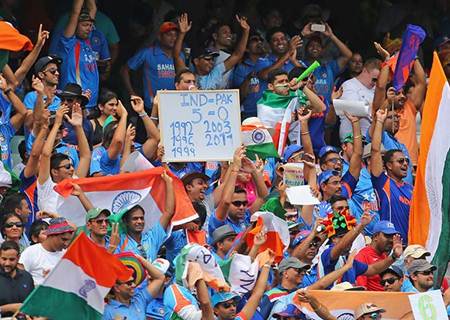 The International Cricket Council has admitted that it deliberately tries to put India and Pakistan in the same group at world events as it is hugely important for the success of tournaments.
The International Cricket Council has admitted that it deliberately tries to put India and Pakistan in the same group at world events as it is hugely important for the success of tournaments.
India and Pakistan meet in the group stage of the Champions Trophy in England next year, making the mouth-watering clash a reality for the fifth successive tournament.
"No doubt we want to try to put India versus Pakistan in our event," ICC chief executive Dave Richardson was quoted as saying by The Telegraph.
"It's hugely important from an ICC point of view. It's massive around the world and the fans have come to expect it as well. It's fantastic for the tournament because it gives it a massive kick."
Richardson, however, denied that the constant clashing between the arch-rivals affects the fairness of ICC events.
"What we try and do is make sure that when you add up the rankings of the different groups, they all add up to the same number of points. You can do that in a number of ways. So long as the pools are balanced, it's silly to avoid (the fixture) when you can fairly cater for it," he added.
The draw for the eight-team tournament was announced in London on Wednesday.
The Asian powerhouses will go head-to-head at Edgbaston, Birmingham, on June 4.
The 18-day tournament runs from June 1 to 18 and will also see matches played at the Cardiff Wales Stadium in Cardiff and The Oval in London.
A couple of days before the all-Asian clash, Australia and New Zealand will lock horns in a repeat of the World Cup 2015 final at Edgbaston.
On Thursday, the ICC said a wrong twist is being given to the groupings.
"David Richardson has explained and clarified in the same interview that the groups were formed on the basis of the eight teams' rankings as on 30 September 2015. It is just a coincidence, like it is that Australia, England and New Zealand are in Group A, that India and Pakistan are in Group B," an ICC spokesman said.
The ICC’s logic is that the first eight teams within the stipulated time frame of September 30, 2015 qualified for the event and it ensured that both groups are equally strong keeping in mind the balance of the sides.
Their explanation is that the cumulative total of the ICC seedings is 18 for both groups.
Australia (1), New Zealand (4), England (6) and Bangladesh (7) comprise Group A. The sum total is 1+4+6+7, which equals 18.
Similarly, in Group B, India (2), South Africa (3), Sri Lanka (5) and Pakistan (8)'s sum total of rankings is also 18.
If an India-Pakistan contest is a big ticket game for the ICC, so are Australia-New Zealand or Australia-England games.
The top eight sides as on September 30, 2015 have qualified for this tournament, with World champions Australia seeded number one. They head Group A, which also includes fourth seeds New Zealand, sixth seeds England and seventh seeds Bangladesh, who will be returning to this competition for the first time since 2006.
India head Group B, which also comprises third seeds South Africa, fifth seeds Sri Lanka and eighth seeds Pakistan.
The top two sides from each group will progress to the semi-finals, which will be played at Cardiff and Edgbaston on June 14 and 15 respectively, with The Oval hosting the final.
Image: Indian fans show their support during the 2015 ICC Cricket World Cup match against Pakistan at the Adelaide Oval.
Photograph: Scott Barbour/Getty Images











